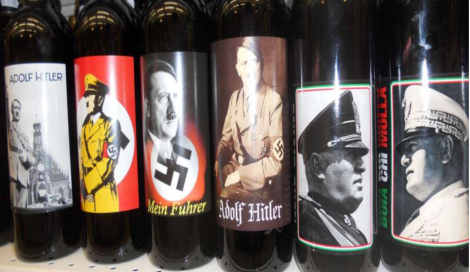“Enough is enough,” Rabbis Marvin Hier and Abraham Cooper, founder and dean and associate dean of the Simon Wiesenthal Center, a Jewish human rights group, said in a statement.
The Rabbis are urging wine distributors in Italy and around the world “not to do any business with someone using the Nazi mass murderer as a blatant marketing tool.”
The statement comes a few days after The Local published a story about a Norwegian couple who stumbled across the wine, featuring images including Adolf Hitler and Benito Mussolini, in a shop in the seaside resort of Rimini.
The Rabbis said they first protested against the wine when it was launched by Vini Lunardelli, a wine company in Udine, in 1995.
“Now an expanded line of wines that demean, diminish and mock Hitler's victims are promoted on a slick website.”
Alessandro Lunardelli, the wine company owner, told The Local last week that the range was intended as a ‘joke gift’ and was not meant to offend anyone. He said the wine is mainly purchased by tourists visiting Italy, although it’s also popular with foreigners buying online from abroad.
"We reject the cynical notion by the company's owner that this wine is marketed as "a joke gift", the Wiesenthal officials added.
"We agree totally with the sentiments expressed recently by a shocked Norweigian tourist when he found the wine on sale in Rimini, Italy.”
This isn’t the first time Vini Lunardelli has come under fire for what it calls its “historical range”.
A probe was launched last year following several other complaints from foreign tourists.
The Italian Integration Minister at the time, Andrea Riccardi, said “this offends the memory of millions of people and risks compromising the image of Italy abroad.”
Lunardelli told The Local that the investigation found the company not to be in the wrong as the wines weren’t intended to be “political or offensive, just marketing”.
The Rabbis concluded: "How sickening is it that such a company operates in a country which first embraced Fascism and later, when occupied by the Germans, saw many of its countrymen executed by the Nazi Third Reich?"
Meanwhile, other tourists have confirmed to The Local that Third Reich wine was also being sold in a store in Lake Garda, northern Italy featuring images of Hitler and other leading generals from the Nazi era. The store, however, had erected a large sign around the wine telling tourists that taking pictures of the bottles was forbidden.



 Please whitelist us to continue reading.
Please whitelist us to continue reading.
Member comments